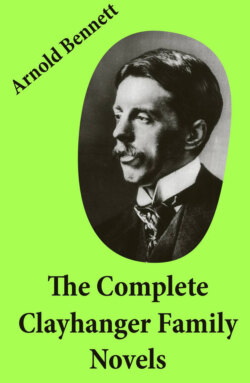Читать книгу The Complete Clayhanger Family Novels (Clayhanger + Hilda Lessways + These Twain + The Roll Call) - Arnold Bennett - Страница 190
На сайте Литреса книга снята с продажи.
Two.
ОглавлениеDarius Clayhanger was standing at the north-east corner of the little Square, half-way up Duck Bank, at the edge of the pavement. And his gaze, hesitant and feeble, seemed to be upon the shop. He merely stood there, moveless, and yet the sight of him was most strangely disconcerting. Edwin, who kept within the shelter of the doorway, comprehended now the look on Stifford’s face. His father had the air of ranging round about the shop in a reconnaissance, like an Indian or a wild animal, or like a domestic animal violently expelled. Edwin almost expected him to creep round by the Town Hall into Saint Luke’s Square, and then to reappear stealthily at the other end of Wedgwood Street, and from a western ambush stare again at his own premises.
A man coming down Duck Bank paused an instant near Darius, and with a smile spoke to him, holding out his hand. Darius gave a slight nod. The man, snubbed and confused, walked on, the smile still on his face, but meaningless now, and foolish.
At length Darius walked up the hill, his arms stiff and out-pointing, as of old. Edwin got his hat and ran after him. Instead of turning to the left along the market-place, Darius kept on farther up the hill, past the Shambles, towards the old playground and the vague cinder-wastes where the town ended in a few ancient cottages. It was at the playground that Edwin, going slowly and cautiously, overtook him.
“Hello, father!” he began nervously. “Where are you off to?”
Darius did not seem to be at all startled to see him at his side. Nevertheless he behaved in a queer fashion. Without saying a word he suddenly turned at right-angles and apparently aimed himself towards the market-place, by the back of the Town Hall. When he had walked a few paces, he stopped and looked round at Edwin, who could not decide what ought to be done.
“If ye want to know,” said Darius, with overwhelming sadness and embittered disgust, “I’m going to th’ Bank to sign that authority about cheques.”
“Oh!” Edwin responded. “Good! I’ll go with you if you like.”
“Happen it’ll be as well,” said Darius, resigning himself.
They walked together in silence.
The old man was beaten. The old man had surrendered, unconditionally. Edwin’s heart lightened as he perceived more and more clearly what this surprising victory meant. It meant that always in the future he would have the upper hand. He knew now, and Darius knew, that his father had no strength to fight, and that any semblance of fighting could be treated as bluster. Probably nobody realised as profoundly as Darius himself, his real and yet mysterious inability to assert his will against the will of another. The force of his individuality was gone. He, who had meant to govern tyrannically to his final hour, to die with a powerful and grim gesture of command, had to accept the ignominy of submission. Edwin had not even insisted, had used no kind of threat. He had merely announced his will, and when the first fury had waned Darius had found his son’s will working like a chemical agent in his defenceless mind, and had yielded. It was astounding. And always it would be thus, until the time when Edwin would say ‘Do this’ and Darius would do it, and ‘Do that’ and Darius would do it, meekly, unreasoningly, anxiously.
Edwin’s relief was so great that it might have been mistaken for positive ecstatic happiness. His mind ranged exultingly over the future of the business. In a few years, if he chose, he could sell the business and spend the whole treasure of his time upon programmes. The entire world would be his, and he could gather the fruits of every art. He would utterly belong to himself. It was a formidable thought. The atmosphere of the marketplace contained too much oxygen to be quite grateful to his lungs... In the meantime there were things he would do. He would raise Stifford’s wages. Long ago they ought to have been raised. And he would see that Stifford had for his dinner a full hour; which in practice Stifford had never had. And he would completely give up the sale and delivery of newspapers and weeklies, and would train the paper-boy to the shop, and put Stifford in his own place and perhaps get another clerk. It struck him hopefully that Stifford might go forth for orders. Assuredly he himself had not one quality of a commercial traveller. And, most inviting prospect of all, he would stock new books. He cared not whether new books were unremunerative. It should be known throughout the Five Towns that at Clayhanger’s in Bursley a selection of new books could always be seen. And if people would not buy them people must leave them. But he would have them. And so his thoughts flew.
